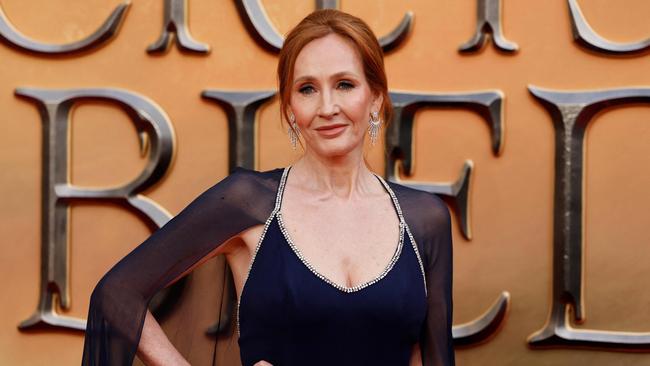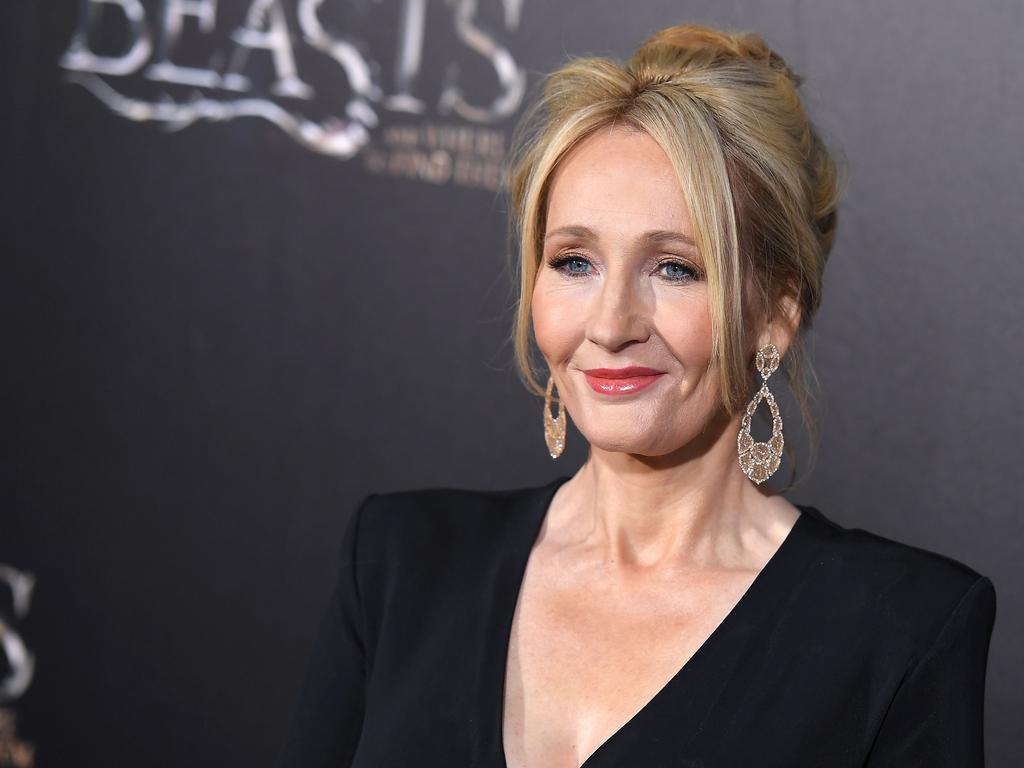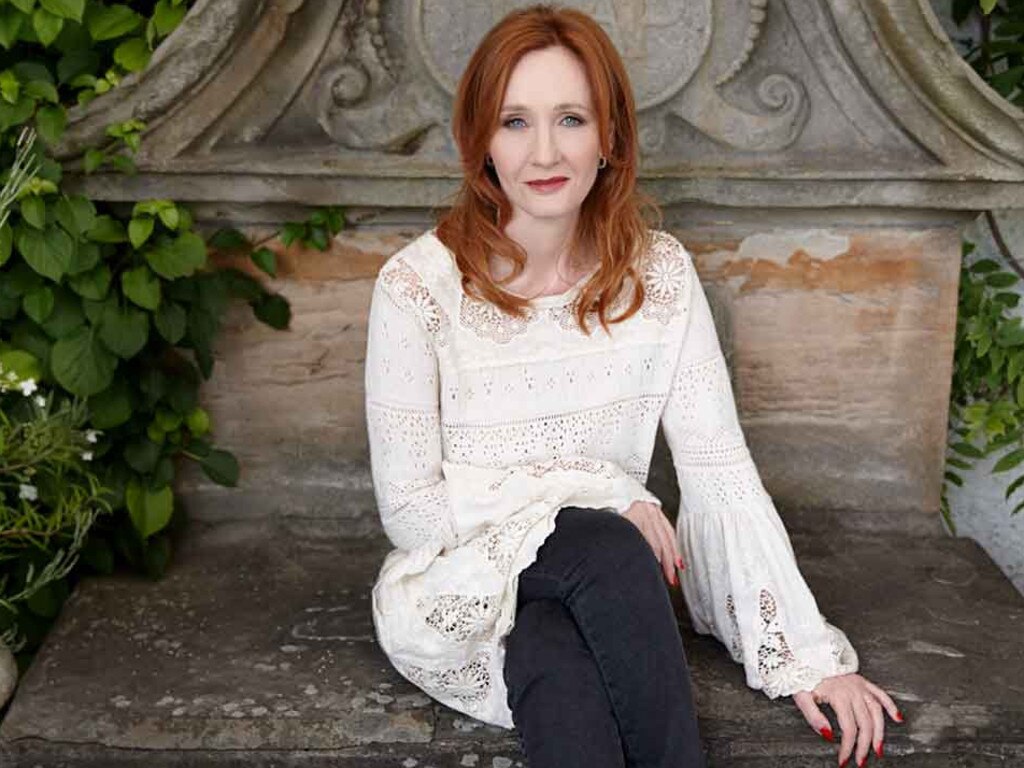Expelliarmus! Why JK Rowling became the face of the culture war
As the third Fantastic Beasts film is released to fanfare and her book sales keep booming, how has the Harry Potter author toughed it out against the trolls?

This is a big day in JK Rowling’s Wizarding World, or, as it is now more cautiously called, simply Wizarding World. The Secrets of Dumbledore, the third of the Fantastic Beasts movies that serve as prequels to everything Harry Potter, is finally out. The word, including from our critic Kevin Maher, is that the $267 million ($US200 million) film is indeed a fantastic beast.
It considerably raises the Harry Potter stakes. Trailers warn us that “the world is coming undone and the unimaginable will seem inevitable”. So the film is topical too, in all kinds of ways. For one, it was unimaginable when the first Harry Potter movie came out in 2001 that two decades later the Potter universe’s prime mover, JK Rowling, would be anything less than a secular saint, the woman who rescued reading for a generation. Yet Joanne Rowling is now someone we are all expected to have an opinion on: are we for or against her?
It was in June 2020 that Rowling’s reputation fissured. She had tweeted a response to a sustainable development website’s use of the phrase “people who menstruate": “I’m sure,” she teased, “there used to be a word for those people. Someone help me out. Wumben? Wimpund? Woomud?”
‘People who menstruate.’ I’m sure there used to be a word for those people. Someone help me out. Wumben? Wimpund? Woomud?
— J.K. Rowling (@jk_rowling) June 6, 2020
Opinion: Creating a more equal post-COVID-19 world for people who menstruate https://t.co/cVpZxG7gaA
The jibe compounded earlier hints on social media, hints at first explained away by a publicist, that on trans rights she was not on the same page as transgender activists. Tweet after tweet followed. The abuse started. She did not fold. She doubled down.
For some transgender rights activists she was now Voldemort. The desire that Rowling may “fit in a hearse” became a song. Demonstrations were held outside her home in Edinburgh. Most (but not all) of the cast of the Potter movies dissociated themselves from her. A senior writer on The Daily Telegraph, observing that her name was all but invisible on a Secrets of Dumbledore trailer, concluded that she had been cancelled. Vladimir Putin declared himself outraged; Rowling indicated her gratitude with the hashtag #IStandWithUkraine.
The outrage has been extreme, and some of it performative, but beneath the animus lies a quieter sadness. The Leaky Cauldron, once Rowling’s favourite Harry Potter fan site, has since July 2020 refused to cover her activities, will not quote her if it can help it and cannot bear to have her picture on its pages.
Emma Pocock, its former senior editor, now running a coffee shop in London, is no longer involved. She says she does not see Rowling as Voldemort but her refusal to hear out people who know or work with transgender people seemed dangerous. And trans people are Harry Potter fans too. “There’s a lot of marginalised people in the Harry Potter community because it’s a space where people did come to feel safe,” Pocock says. “It just feels so different now. She’s completely tainted the experience of it for a lot of fans.”
The about-turn from quasi-fanatical devotion to, at best, sorrow and, at worst, demonisation is a twist worthy of the fictional saga itself. It is an almost parental rejection. Many will surely look back on this time as their transitional moment from child to adult. But was what was once “unimaginable” also, in retrospect, “inevitable"?
Rowling rarely meets the press these days, but during her early rise the Times journalist Ann Treneman interviewed her three times. First in 1997, when sales had reached 30,000, then again in 2000, when they stood at 30 million. Rowling, she recorded, had survived a bad marriage, brought up a child on her own, written in cafes in the crevices of her days and been rejected by publisher after publisher. In 2000, she noted, Rowling’s one extravagance had been to buy herself an aquamarine ring. She called it her “No One Is Grinding Me Down Ring”.
“I mean,” Treneman says now, “Joanne was always a bit ‘no bullshit’. And it had to be that way because Harry Potter was kind of too big, too big for the world really.”
In their last interview, in 2003, Rowling said that after her fourth book, The Goblet of Fire, she had taken almost a year’s break from writing to process everything that had happened. For a while, she admitted, she had not been coping, but Rowling eventually tamed this thing that was too big for the world, the fantastic beast of her fame. She used it so that it served the causes she cared about, sometimes with money – to Refuge, for instance, a charity helping victims of domestic violence – and sometimes, as now, with her opinions.
“One of the things I’m hoping you’re going to chart,” Treneman says, “is that Joanne has really found her public voice. She will always be a writer but I think she’s worked very hard to get this other voice working. Now she’s found her voice as a person, and she really tells it like she sees it. She tweeted something today (Friday) about bearded men and it was hilarious.”
Tuesday’s tweet read: “To the many bearded men in my mentions who seem to think the loss of their approval is a mortal blow: it’s like being told I’ve lost a space hopper.” The bearded men presumably referred to Corbynistas, for whom this Gordon Brown Labourite has little time. There ensued a satisfying debate on the merits of the kangaroo-eared bouncing balls ridden by kids in the Seventies. There is a joy to Rowling’s sallies.
“What I love about her,” Treneman continues, “is she doesn’t seem to care what people think, and that must be very freeing for her, because I think she did care for a long time what people thought of her.”
Rowling is 56 now. The children who were her first readers are in their late thirties. Many may share her intellectual irritation when they hear biological sex playing second fiddle to the theory of gender identity. They may admire, as I do, the wit of her social media posts, her refusal to be “ground down”.
Her present-day teenage readers have a voice of their own too, however. It is almost instinctively respectful of difference and their right to declare who they are. Reservations, they are politely expressed. A month ago on International Women’s Day, Rowling tweeted: “Apparently, under a Labour government, today will become We Who Must Not Be Named Day.” “You have no idea how much harm you are doing,” someone replied.
Nothing Rowling tweets is actually evidence of transphobia, certainly not in its literal sense of a morbid fear of transgender people. Nor is her sarcasm the only public voice she has applied to the debate.

In a piece in The Sunday Times in June 2020 Rowling attempted a conciliatory tone, praising the writing of young “trans men” as revealing “a group of notably sensitive and clever people”. Nevertheless, the article was mainly a defence of biologically born women in the “most misogynistic period” she had experienced. Her first marriage had been violent. Her solidarity was with women with histories like hers who had been “slurred as bigots for having concerns around single-sex spaces”. Yet this voice proved unpopular too, for some an elision of distinct issues or else a plea for sympathy (which she explicitly said it wasn’t). Perhaps it was too clever.
Mermaids, a controversial but well-established British charity supporting “transgender, non-binary and gender-diverse children” and their families, was articulate too when we asked for its thoughts on Rowling. It told us: “For those people working with trans children, young people and families, it’s important to understand that this is not a gladiatorial sport to be won or lost with a tweet, a forum post, a weekly radio debate followed by an opinion article or a well-timed blog post preceding a parliamentary decision.
“This isn’t about a ‘woke’ majority enforcing politically correct beliefs on others. This is about people’s lives. Trans young people should not be used to amplify separate issues such as male violence, bodily autonomy or patriarchy.”
There was, Mermaids said, a mental health crisis among the trans community: 54 per cent of young trans people suffer depression; 72 per cent self-harm. “Those who seek to use their considerable platforms to try and create division, spark ‘debate’ and spread harmful views are actively seeking to cause harm.”
It is a sobering riposte to those of us who rather enjoy the sound of Rowling crashing through the ever narrowing Overton window of liberal thought. It makes us pause to ponder other people’s feelings. And, ironically enough, most would say that the underlying aim of the Harry Potter oeuvre is also that. Indeed, an Italian university once found that children’s “empathy levels” went up after reading Harry Potter.
In other ways too, trans is an unexpected battle for Rowling to fight. She uses genderless initials rather than her first name on her children’s books – she has said she feels sexless while writing them – and transitions to “Robert Galbraith” for her adult work. She is certainly not homophobic: one of Dumbledore’s secrets in the new film is his homosexual love for a fellow wizard.

Also, while the sea-green charm on her finger reminds her not to be ground down, she is quick to the defence of those who also find themselves in the social media mill. This week’s beardsplainer intervention was in the support of a Jewish writer, Nicole Lampert, who was being excoriated for methodically investigating the claim that trans people had been killed in the Holocaust and finding it wanting. (Rowling may or may not have read Lampert’s earlier exoneration of her from the charge that the Gringotts bank goblins in the Harry Potter films were antisemitic tropes.)
Treneman believes Rowling, more than many of the rich and famous, is “a real world person”. She engages with the Muggle world. Yet, as Treneman also suggests, Harry Potter is a beast that exists in its own universe, and there is really no stopping it. I ask Tom Tivnan, managing editor of The Bookseller, what the tarring of Rowling’s name has done to her sales.
“It hasn’t affected her one bit,” he replies. “There have been a few holes in the data owing to lockdowns over the last couple of years, but she (including her Robert Galbraith books) sold $22.2 million (£12.7 million) last year, second only to Julia Donaldson (there were ten weeks of missing data in 2021, so it would probably be about $3.5 million (£2 million) more). It was the same in 2020 when she was the third best-selling author. So all during this furore, her sales have remained steadfast. She had one of the big hits in Christmas 2021, The Christmas Pig with illustrator Jim Field, which sold around 300,000 copies, the ninth biggest seller of 2021.”
One of the most interesting comments we heard in our researches came from 23-year-old Hannah Lee, who writes Harry Potter fan fiction but because of Rowling’s trans views is boycotting the new movie. “When I was a child,” she said, “I kind of thought the books were just books. I didn’t think about how they came to be. I didn’t think about who wrote them very much.
“I wouldn’t have called myself a fan of JK Rowling. I would have called myself a fan of Harry Potter, just because I was a child. So for me, when I started hearing her comments and knowing that I disagreed, it didn’t feel like a betrayal.”
The second trailer for The Secrets of Dumbledore came out a month ago and its creator’s name was back, “from JK Rowling” exploding full screen, a minute in. So Putin is wrong: he may believe Mariupol cancelled; JK Rowling has not been. And even if she had been, it would take the darkest wizardry to cancel her boy magician. Here’s another, final thing. Twenty-one years ago the trailer for Harry Potter and the Philosopher’s Stone didn’t mention her at all. It didn’t need to. The magic was always bigger than JK Rowling.
Additional reporting by Georgina Roberts
The Times





To join the conversation, please log in. Don't have an account? Register
Join the conversation, you are commenting as Logout